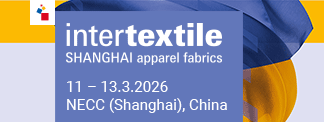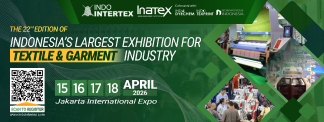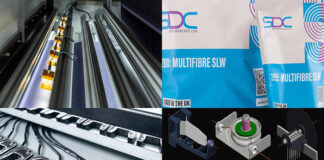RSWM Limited, one of the flagship company under the LNJ Bhilwara Group, is a prominent player in India’s textile industry, specializing in the manufacturing and export of synthetic, cotton, denim, knitted fabric and blended spun yarn. RSWM-led by Riju Jhunjhunwala, Chairman and Managing Director, the company boasts 12 manufacturing plants equipped with 6.25 lakh spindles, 172 looms, and 95 circular and flat knitting machines.
With an annual production capacity of 1,21,000 metric tonne (MT) Greige Yarn, 24,000 MT Melange yarn, 32,000 MT Dyed yarn, 32 M Meters Denim Fabric, 9000+ MT Knits Fabric, and 43,000 MT Green Fibre, RSWM caters to markets in over 70 countries.
Textiles South Asia caught up with Yogesh Tiwari, Business Head and Chief Executive, Melange Yarn Business of RSWM Limited, at Yarnex 2024, New Delhi, to discuss the company’s offerings and future plans.
Yarnex, a key platform in India for discovering the latest in fibres and yarns, brought together manufacturers and suppliers from major textile hubs like Ludhiana, Mumbai, and Tirupur. Held last month in Delhi, the heart of India, the event attracted both local and international participants, drawing a footfall of around 15,000 people and offering opportunities to explore trends and connect with industry leaders.
Sadhana Mishra, correspondent of Textiles South Asia: Could you elaborate on RSWM’s core business and its distinct offerings?
Yogesh Dutt Tiwari: RSWM is primarily recognized for its textile products, particularly synthetics. However, our melange yarn business, which commenced in 1993, has been a significant focus for the past 25 years. Apart from yarn, we also specialize in knitting and denim, with the latter being a separate vertical. RSWM Ltd. alone contributes to a turnover of Rs 4,057 crores.
Textiles South Asia: What is the theme of your new collection, and what inspired it?
Yogesh Dutt Tiwari: Our Melange collection is centered around autumn/winter 25/26 and features a color palette inspired by the global scenario, particularly the ongoing war. We’ve chosen colors that symbolize peace and harmony. The collection showcases various color combinations that convey a message of tranquility.
Textiles South Asia: Could you elaborate on Melange Yarn and its distinguishing features?
Yogesh Dutt Tiwari: Melange yarn is a high-value product that differs from traditional yarns in its unique blend of fibers and shades. Unlike conventional yarns that are dyed either as raw white or after fiber dyeing, Melange yarn involves a meticulous process of mixing shades and fibers to create distinct textures.
Textiles South Asia: Which fibers are currently in high demand for Melange yarn, and how is RSWM addressing this trend?
Yogesh Dutt Tiwari: Melange yarn is consistently in trend, with approximately 20% of demand attributed to this category. The key to Melange yarn lies in experimentation with fibers, shades, and effects. We focus on innovation to meet the evolving preferences of the market.
Textiles South Asia: What are the primary applications of Melange yarn, and which end-use sectors benefit the most from its properties?
Yogesh Dutt Tiwari: Melange yarn enjoys widespread acceptance across various sectors. It is particularly popular in hosiery, including circular knit and flat knit products. Additionally, it finds application in woven fabrics like shirting.
Textiles South Asia: Does RSWM employ specialized machinery for Melange yarn production, or does it utilize the same equipment as for other yarn types?
Yogesh Dutt Tiwari: While the basic machinery is similar to that used for synthetic and cotton yarns, the production process for Melange yarn is distinct. It involves multiple stages, including sliver creation, dyeing, and texture development, requiring a higher level of expertise and innovation.
Textiles South Asia: What are the primary challenges and benefits of manufacturing Melange yarn?
Yogesh Dutt Tiwari: The production of Melange yarn demands a high degree of innovation and agility to meet tight lead time requirements. However, the potential for creating unique and high-value products makes it a rewarding endeavor.
Textiles South Asia: How is RSWM incorporating sustainable practices into Melange yarn production?
Yogesh Dutt Tiwari: Sustainability is a core focus for RSWM, and we have implemented comprehensive measures across the value chain. Our commitment includes using recycled polyester fiber, organic cotton, and eco-friendly dyes and chemicals. We have also adopted water recycling and renewable energy sources to minimize our environmental impact.
Textiles South Asia: Does RSWM export Melange yarn, and if so, to which markets? What are the prevailing trends in the global yarn market?
Yogesh Dutt Tiwari: Approximately 40% of our Melange yarn production is exported to various global markets, primarily through buying houses catering to international brands. The ongoing war and its impact on freight costs and economic conditions pose significant challenges to the industry.
Textiles South Asia: How do you envision the future of the Melange yarn industry, and what strategies is RSWM adopting to shape this future?
Yogesh Dutt Tiwari: We believe that Melange yarn will continue to be in demand, and RSWM is well-positioned to capitalize on this trend. By expanding our Melange yarn production capacity and focusing on innovation, we aim to strengthen our position in the global market.












